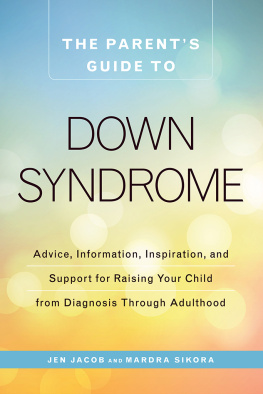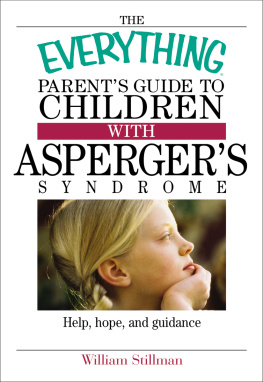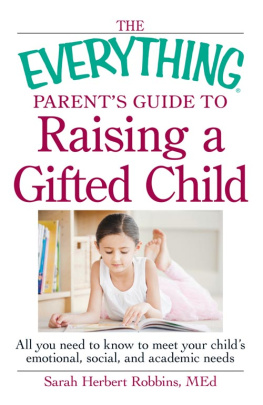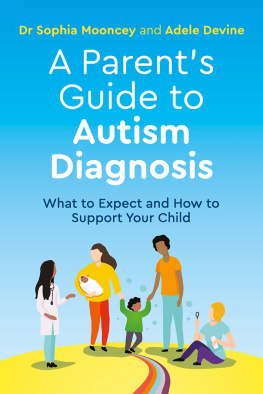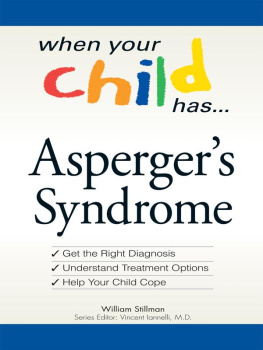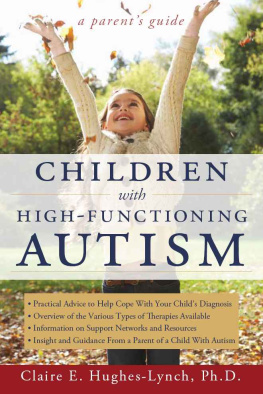Contents
Guide
The Parents
Guide to
DOWN SYNDROME
Advice, Information, Inspiration, and Support for Raising Your Child from Diagnosis Through Adulthood
Jen Jacob and Mardra Sikora

AVON, MASSACHUSETTS
Dedication
To all those helping us navigate this wild ride.
To all those who have reconstructed the world to make the ride better and more inclusive for us and our children.
And to all of those who have just boarded, a little anxious for the climbs, the drops, and the thrills.
Thank you to Stacey Calcano and Jenny DiBenedetto for their additional sets of eyes throughout the editing process.
The two most important days in your life are the day you are born and the day you find out why. MARK TWAIN
Contents
Introduction
Perhaps you have just heard that your child has Down syndrome. You may be still reeling, your mind packed with conflicting and confusing thoughts. You love your child but may be unsure of the future.
We understand. You are not alone.
The main thing you want to know is what life will be like for your child with Down syndrome. What will your lives be like, as parents? Thats understandable. What we will do for you, as a new parent, is to help you with the answers to the most common questions about a life with Ds, from prenatal diagnosis into adulthood.
In , we introduce you to explanations and diagnoses, starting with what Down syndrome is and the different types of Down syndrome. Then well talk about terms, obligations, and important dates as you become part of the Down syndrome community.
Well take you from the prenatal diagnosis, which includes processing the diagnosis and sharing it with family and friends, to the medical monitoring considerations as your family builds a team to support you and your child. Well also discuss the postnatal diagnosis experience and what processing and sharing the news may look like in that case.
covers many of the issues that youll need to understand; these questions span the lifetime of a person with Down syndrome. The first three chapters of this part cover from the birth of your child to age five. Youll learn how to get connected to your newborn, even if there is extended hospital time. Then well move on to starting early intervention education and therapies. Even in these early years, its important to begin working with local educators and begin the transition into school. Along the way, well discuss when to expect certain milestones, explain common medical conditions, and show how to help your child meet his or her challenges.
The next big step is primary school. Youll need to understand the laws currently in place to ensure the best possible outcomes when choosing a school for your child. Youll learn the process of building and communicating with your childs team of educators and your community.
Self-advocacy means teaching your child to speak up for himself or herself and to make goals and follow dreams for his or her future. This begins with developing social skills and seeing the importance of social interactions. We focus on activities, organizations, and suggestions to help someone with Down syndrome develop and enjoy social activities at each stage of his or her life.
Once your child reaches the teenage years, youand theywill be thinking about graduation from high school and the next transition in life. Well discuss all of this including a section on college and post-secondary educational opportunities as they look right now for young adults with Down syndrome.
What does life look like for adults with Down syndrome? Many parents fear adulthood for their children; its a great unknown. Well give a brief overview of the variety of options regarding employment, housing, and relationships. Adults with Down syndrome have, as in many areas of life today, growing opportunities.
Every parent has to face the future. We will discuss some of the issues concerning planning, guardianship, and options to guardianship. As people with Down syndrome age, the medical issues change as well. Well offer tips for people with Ds on staying healthy at every life stage.
Finally, Part Three introduces the world of advocacy, awareness, and involvement. There are many organizations that support and advocate forand withpeople with Down syndrome and their families. We offer ways and whys to find local support, discuss many national and international organizations, how to reach them, what they do, and give a glimpse of what they are working on together to accomplish. Lastly, we provide information and discussion on research organizations that specialize in Ds, what is on their agendas, and how you can get involved. At the end of each chapter, we provide links to online resources for your further exploration.
There are many public figures, people in the media and the arts, with Down syndrome. Youll meet some of them in these pages. Also, parents are connecting with each other around the world via online forums, blogs, and websites. We will share a few of the many online resources and maybe youll even be encouraged to add your own story.
Throughout the book are the voices of people with Down syndrome. In the Our Experience sections, adults speak about their lives and offer you new parents valuable advice. We also hope you find comfort in hearing from parents, like yourself, who may have had the same thoughts and worries on their journey. Most of all, we hope to provide you the kinds of resources, tips, and ideas that we wish we had when we started this journey.
Down syndrome never expresses the same way in any two people. The combination of genetics, environment, science, and love that makes every person unique is not erased or diminished by Down syndrome. Your child will be an individual, and you will play an important role in shaping his or her world.
NOTES FROM THE AUTHORS
Sure, I was shocked and scared when three hours into my official motherhood I heard the phrase Down syndrome. However, no label could ever ever overpower the connection between us, my son and me. I was a mother. His mother. The world became ours in that moment.
Mardra
I would never have guessed that having a child with Down syndrome would change my life in so many incredible ways. Life is, of course about the journey for our children, but also so much about our often-parallel journey alongside them.
Jen
Part One
THE BASICS
Chapter One
What Is Down Syndrome?
Whether you are looking for scientific specifics or general information, resources abound to gain a better understanding of Down syndrome. Your first instinct will probably be to go to the Internet. Although you can find a lot of important information there, be careful about accepting all of it as true. Diverse opinions and thoughts, not all well informed, spread across your computer screen.
Instead, focus upon resources that provide current, complete information. Look for materials that show the celebrations and the struggles. Like anything in life, Down syndrome involves a wide range of experiences.
Facts about Down Syndrome:
- Down syndrome is a common genetic condition involving the twenty-first chromosome.

